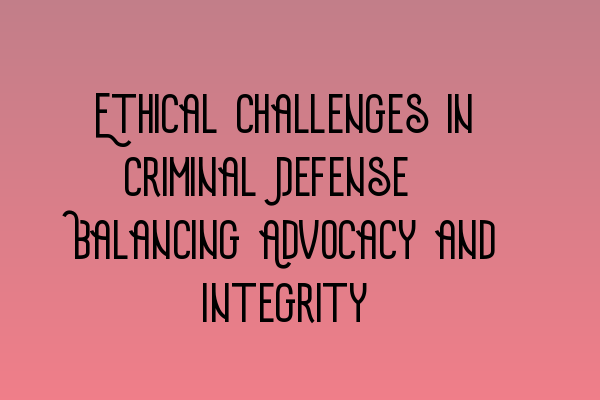Ethical Challenges in Criminal Defense: Balancing Advocacy and Integrity
Being a criminal defense solicitor is no easy task. It requires a delicate balance between advocating for your client’s rights and upholding the highest standards of integrity. In the criminal justice system, ethical challenges are often encountered, and navigating them is crucial to maintaining the trust of both clients and the legal profession. In this article, we will explore the most common ethical challenges faced by criminal defense solicitors and how they can effectively navigate them.
The Duty of Zealous Advocacy
One of the fundamental principles of criminal defense is the duty of zealous advocacy. Solicitors have the responsibility to vigorously defend their clients’ interests while upholding the rule of law. However, this duty can sometimes clash with ethical considerations, such as a solicitor’s obligation to disclose all relevant information to the court.
It is important for solicitors to remember that zealous advocacy does not mean that ethics can be compromised. Striking the right balance requires careful judgment and a thorough understanding of professional obligations. A well-rounded criminal defense solicitor is not only an advocate but also an advisor, guiding clients towards making informed decisions.
Conflicts of Interest
Conflicts of interest can arise in criminal defense when a solicitor has multiple clients, some of whom may have conflicting interests. This can occur, for example, when two co-defendants have differing accounts of events or when representing clients with conflicting defense strategies.
To address conflicts of interest, solicitors must prioritize their clients’ best interests, and where necessary, advise clients to seek independent legal representation. By maintaining strict confidentiality and ensuring that the duty of loyalty is not compromised, solicitors can navigate these challenges ethically and effectively.
Professional Boundaries and Communication
Building a strong relationship with clients is essential in criminal defense. However, solicitors must always maintain professional boundaries and ensure that their communication with clients is ethical. This includes avoiding any misleading statements, overpromising outcomes, or encouraging dishonesty.
It is crucial to provide clients with realistic expectations, explaining the strengths and weaknesses of their case, and the potential legal consequences. By communicating openly and honestly, solicitors can build trust and navigate ethical challenges effectively.
Continuing Professional Development and Ethics
As criminal law constantly evolves, solicitors must stay up-to-date with changes in legislation, case law, and ethical guidelines. Continual professional development ensures that solicitors are equipped with the knowledge and skills necessary to navigate the ethical challenges that arise in their practice.
Organizations like SQE 1 Practice Exam Questions and SQE 1 Practice Mocks FLK1 FLK2 offer comprehensive preparation resources for solicitors, including ethics-focused materials. By engaging in such courses, solicitors can enhance their understanding of ethical issues and improve their ability to address them.
Conclusion
The ethical challenges faced by criminal defense solicitors are complex, but by balancing advocacy with integrity, these challenges can be effectively navigated. Upholding professional obligations while vigorously advocating for clients is a delicate balance that requires constant self-reflection, ethical decision-making, and continuing professional development.
For more information on preparing for the SQE exams, you can explore SQE 2 Preparation Courses and SQE 1 Preparation Courses. Stay updated with the latest SRA SQE Exam Dates to plan your studies effectively.
